Zhimiao Yu
QuaDMix: Quality-Diversity Balanced Data Selection for Efficient LLM Pretraining
Apr 23, 2025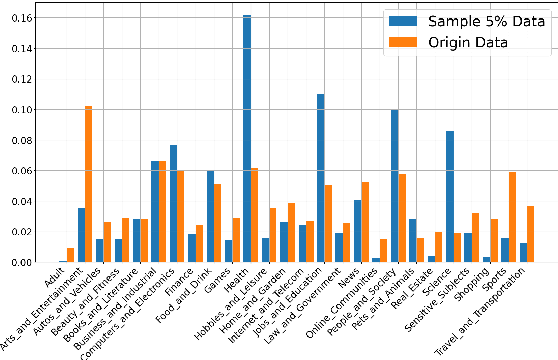
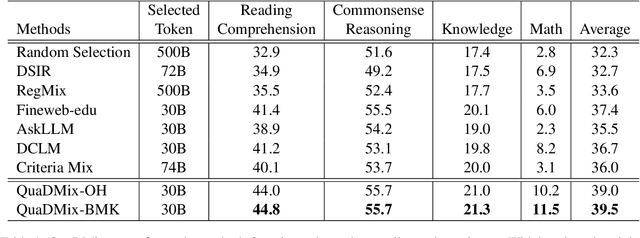
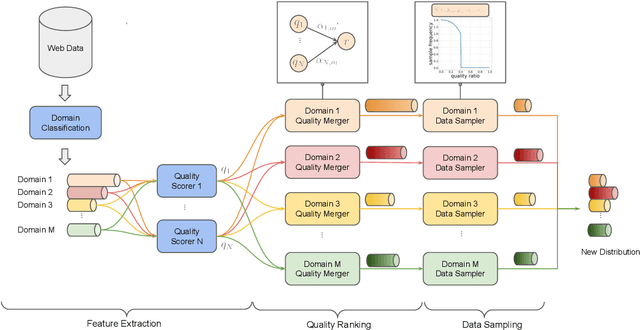

Abstract:Quality and diversity are two critical metrics for the training data of large language models (LLMs), positively impacting performance. Existing studies often optimize these metrics separately, typically by first applying quality filtering and then adjusting data proportions. However, these approaches overlook the inherent trade-off between quality and diversity, necessitating their joint consideration. Given a fixed training quota, it is essential to evaluate both the quality of each data point and its complementary effect on the overall dataset. In this paper, we introduce a unified data selection framework called QuaDMix, which automatically optimizes the data distribution for LLM pretraining while balancing both quality and diversity. Specifically, we first propose multiple criteria to measure data quality and employ domain classification to distinguish data points, thereby measuring overall diversity. QuaDMix then employs a unified parameterized data sampling function that determines the sampling probability of each data point based on these quality and diversity related labels. To accelerate the search for the optimal parameters involved in the QuaDMix framework, we conduct simulated experiments on smaller models and use LightGBM for parameters searching, inspired by the RegMix method. Our experiments across diverse models and datasets demonstrate that QuaDMix achieves an average performance improvement of 7.2% across multiple benchmarks. These results outperform the independent strategies for quality and diversity, highlighting the necessity and ability to balance data quality and diversity.
Background Clustering Pre-training for Few-shot Segmentation
Dec 06, 2023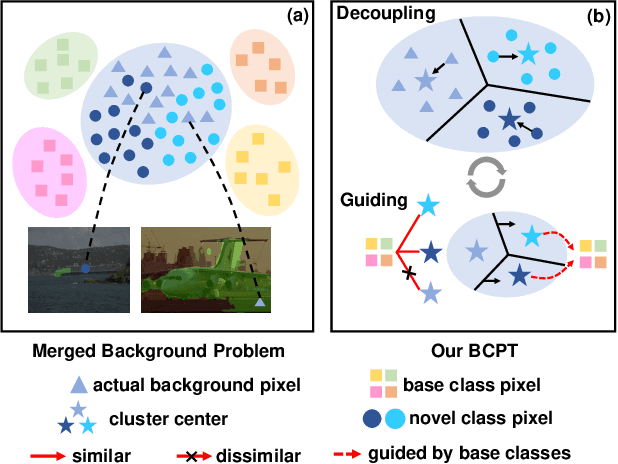
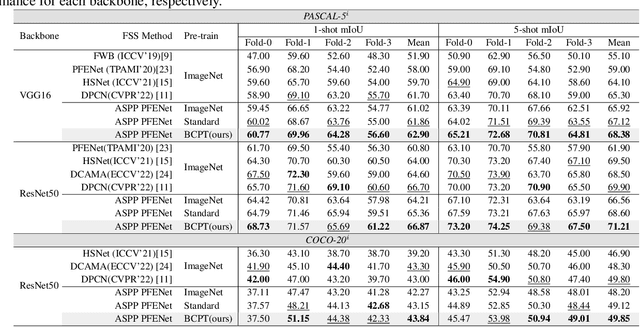
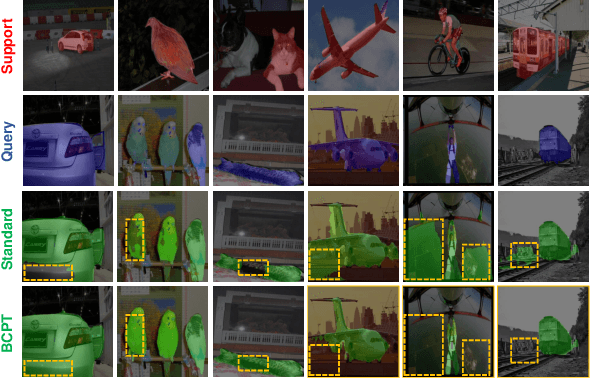

Abstract:Recent few-shot segmentation (FSS) methods introduce an extra pre-training stage before meta-training to obtain a stronger backbone, which has become a standard step in few-shot learning. Despite the effectiveness, current pre-training scheme suffers from the merged background problem: only base classes are labelled as foregrounds, making it hard to distinguish between novel classes and actual background. In this paper, we propose a new pre-training scheme for FSS via decoupling the novel classes from background, called Background Clustering Pre-Training (BCPT). Specifically, we adopt online clustering to the pixel embeddings of merged background to explore the underlying semantic structures, bridging the gap between pre-training and adaptation to novel classes. Given the clustering results, we further propose the background mining loss and leverage base classes to guide the clustering process, improving the quality and stability of clustering results. Experiments on PASCAL-5i and COCO-20i show that BCPT yields advanced performance. Code will be available.
SLPD: Slide-level Prototypical Distillation for WSIs
Jul 20, 2023Abstract:Improving the feature representation ability is the foundation of many whole slide pathological image (WSIs) tasks. Recent works have achieved great success in pathological-specific self-supervised learning (SSL). However, most of them only focus on learning patch-level representations, thus there is still a gap between pretext and slide-level downstream tasks, e.g., subtyping, grading and staging. Aiming towards slide-level representations, we propose Slide-Level Prototypical Distillation (SLPD) to explore intra- and inter-slide semantic structures for context modeling on WSIs. Specifically, we iteratively perform intra-slide clustering for the regions (4096x4096 patches) within each WSI to yield the prototypes and encourage the region representations to be closer to the assigned prototypes. By representing each slide with its prototypes, we further select similar slides by the set distance of prototypes and assign the regions by cross-slide prototypes for distillation. SLPD achieves state-of-the-art results on multiple slide-level benchmarks and demonstrates that representation learning of semantic structures of slides can make a suitable proxy task for WSI analysis. Code will be available at https://github.com/Carboxy/SLPD.
Interventional Bag Multi-Instance Learning On Whole-Slide Pathological Images
Mar 13, 2023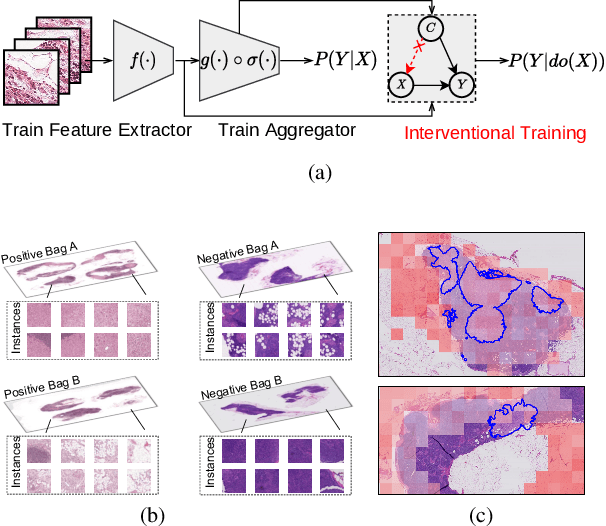
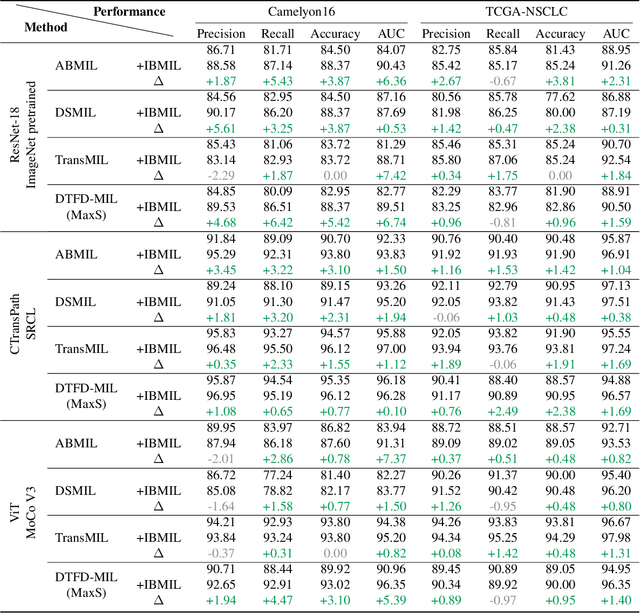
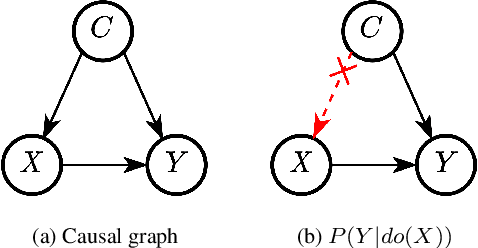
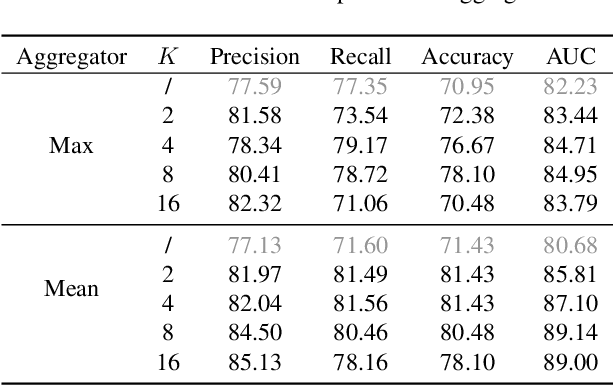
Abstract:Multi-instance learning (MIL) is an effective paradigm for whole-slide pathological images (WSIs) classification to handle the gigapixel resolution and slide-level label. Prevailing MIL methods primarily focus on improving the feature extractor and aggregator. However, one deficiency of these methods is that the bag contextual prior may trick the model into capturing spurious correlations between bags and labels. This deficiency is a confounder that limits the performance of existing MIL methods. In this paper, we propose a novel scheme, Interventional Bag Multi-Instance Learning (IBMIL), to achieve deconfounded bag-level prediction. Unlike traditional likelihood-based strategies, the proposed scheme is based on the backdoor adjustment to achieve the interventional training, thus is capable of suppressing the bias caused by the bag contextual prior. Note that the principle of IBMIL is orthogonal to existing bag MIL methods. Therefore, IBMIL is able to bring consistent performance boosting to existing schemes, achieving new state-of-the-art performance. Code is available at https://github.com/HHHedo/IBMIL.
 Add to Chrome
Add to Chrome Add to Firefox
Add to Firefox Add to Edge
Add to Edge